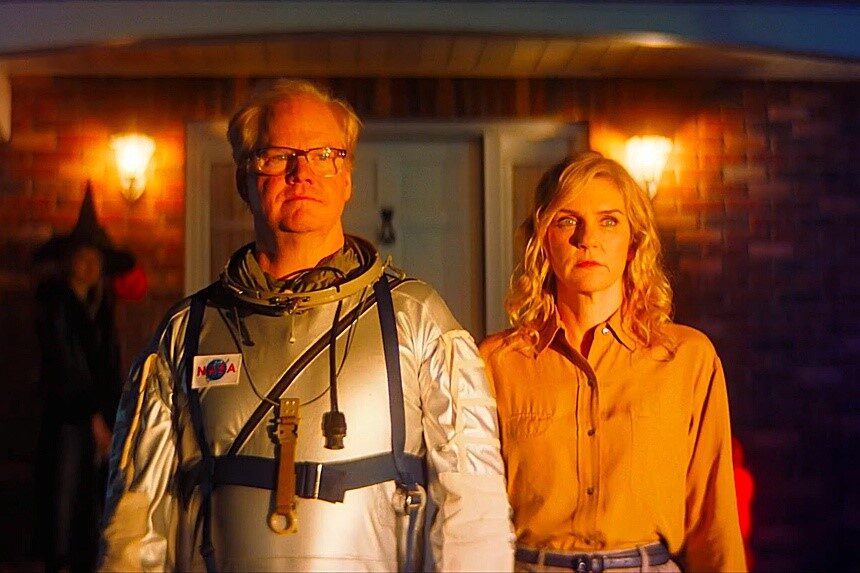Linoleum
⭐️ ⭐️ ⭐️ ⭐️
Not Rated
Run Time: 1 hour 41 minutes
Stars: Jim Gaffigan, Rhea Seehorn, Katelyn Nacon, Gabriel Rush, Tony Shalhoub
Writer/Director: Colin West
Exquisitely balanced as a moon in orbit — pushing toward an escape velocity of whimsy yet irresistibly tugged by the gravity of genuine humanity — Linoleum traces, through phases of dark and light, the trajectory of one man’s unremarkable, yet defiantly purposeful life.
Directing his second feature film, Writer/director Colin West has clearly found inspiration in the analog fantasies of Michel Gondry (Eternal Sunshine of the Spotless Mind) and the psychological puzzle boxes of Alejandro Iñárritu (Birdman). But Linoleum is a strikingly original work; an outrageous meditation on the meaning of lives that, on the face of it, don’t seem to have much meaning at all.
Jim Gaffigan, a very funny comedian who has previously shown strong dramatic chops (Chappaquiddick), stars as Cameron, a onetime astronomy whiz kid and astronaut wannabe who is now reduced to hosting a kids’ science show in small-town Ohio. A Pillsbury Doughboy/Bill Nye hybrid, Cameron pours his love of science — and, presumably, children — into the low-tech project, but the station has scheduled the show in its midnight slot, long after the target audience has been tucked in for the night.
Even worse, he’s just learned that the show, which he created, is being taken away from him and handed to a former astronaut whom Cameron accurately describes as “a younger, slightly more handsome version of me.” (And, in fact, the stoic flyboy is also played by Gaffigan).
As anyone who has ever had a pet project pulled out from under them will attest, he is crushed. But Cameron’s Job-like afflictions continue at home, where his wife, Erin, — his onetime TV sidekick — is impatiently awaiting the arrival of the couple’s divorce papers. Herself a lifelong science geek, Erin has found some level of success as an administrator at a local air and space museum, and is on the verge of moving on to a new museum job two hours away. With his daughter, Nora, heading off to college and his strangely silent son, Sam, still in grade school, Cameron is facing a likely future of lonely aimlessness.
But two startling events occur out of the clear blue sky — literally.
First, as Cameron stops at a mailbox to deposit his latest doomed application for a NASA astronaut position, a shiny red Corvette plunges from above, crashing front-bumper-first into the pavement. The very next day, a long-discarded Apollo program crew module plows into his back yard, leaving a hole full of space junk.
Surveying the Apollo wreckage, Cameron comes to a less-than-logical conclusion: This is a sign from the universe, telling him his dream of going into space will come true. Gathering up the twisted pieces of metal, and consulting his dementia-stricken dad — a onetime rocket scientist — Cameron sets to work constructing a rocket ship that will finally take him to the stars.
From this point on, so many weird and wonderful twists ensue in Linoleum that we all but forget that falling sports car which, when West finally returns to it, turns out to represent the most significant moment in Cameron’s life.
Those twists are of course best left unexamined in a movie review. Linoleum unfolds in its own eccentric time/space dimension, offering tidbits of information that seem somehow important yet disconnected from the story itself. In a wonderful cameo, Tony Shalhoub, as the administrator of Dad’s assisted living facility, seems to be uttering disjointed maxims to a confused Cameron, the true meaning of which we’ll learn much later. A sharp-eyed viewer may begin to piece things together by halfway through the film’s brisk hour and 41 minutes, but it’s probably best to just sit back and let the characters’ lives play themselves through — a lesson they themselves have to learn.
Those of us who hung on each episode of TV’s Better Call Saul will relish every moment Rhea Seehorn is on screen as Cameron’s wife. No one is better at playing the smart, sexy woman whose sole personality flaw, if you can call it that, is undying loyalty to a man who is clearly not good enough for her. As the couple’s awkward but brilliant daughter Nora, Katelyn Nacon perfectly embodies the young adult who is supremely self-confident in all things — except for just where she fits in the world. Nacon is paired off with young Gabriel Rush as Marc, the kindhearted son of that awful astronaut who took away Cameron’s TV show — likewise uneasy with how he is going to make his way through life.
Cameron is clearly the main character here, but we would not at all mind spending an entire film with any of these other characters, each one richly rendered in West’s script.
Those who insist that twisty-turny movie scripts like Linoleum’s must unite all the loose ends in an airtight explanation — 100 percent consistent with the film’s convoluted premise — will be disappointed. The big reveal at the end is a messy one, leaving numerous irreconcilable discrepancies in Cameron’s diverging strands of reality swaying in the wind.
But that’s the whole point: Life is, like it or not, messy and contradictory and maddeningly irrational.
“Sometimes,” Cameron tells Nora in a private moment, “things just happen.”
Become a Saturday Evening Post member and enjoy unlimited access. Subscribe now



